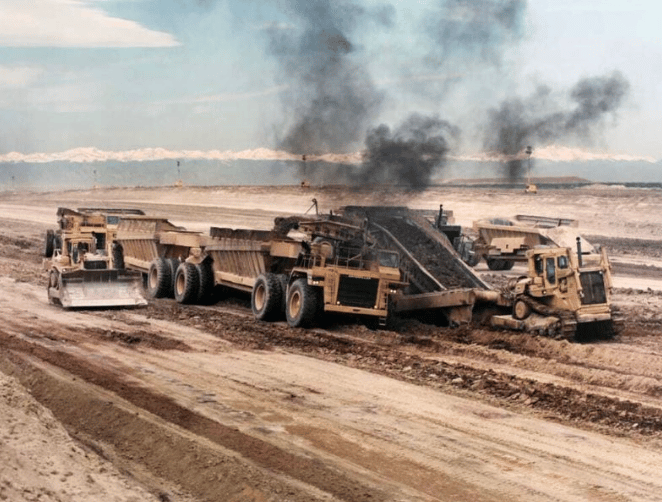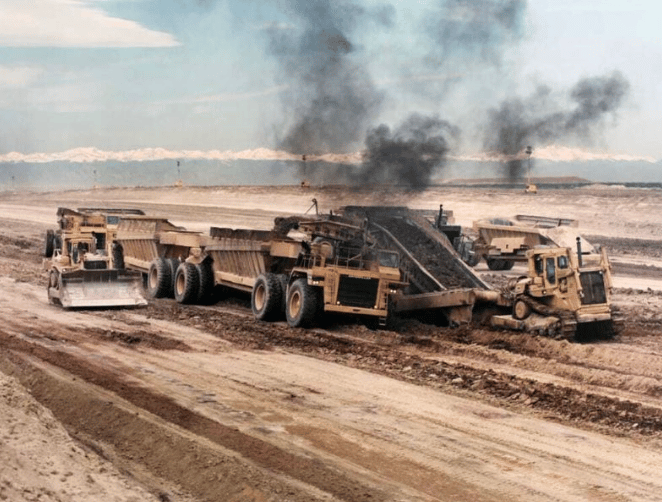- Edgevanta Weekly
- Posts
- How Ames Won Hundreds of Millions By Moving Dirt Nobody Paid Them For
How Ames Won Hundreds of Millions By Moving Dirt Nobody Paid Them For
Your essential guide to dominating the civil construction world with the latest tech, market trends, and wisdom.

I recently attended BuildWitt’s Dirt World Summit. My friend Aaron Witt told me a story a few weeks back that changed how I think about competitive advantage.
Denver needed a new airport in the 1980s. Not a renovation - a complete rebuild on 50 square miles of empty land, 30 minutes from downtown.
Ames Construction had spent three decades working Denver's earthmoving market. When the airport project went to bid, they saw their shot.
But Tom and Larry Ames didn't just sharpen their pencils and submit numbers. They leased land next to the future site, mobilized a fleet of scrapers, and moved 50,000 yards of dirt with their own money to measure actual production rates.

Scrapin’… Photo Credit: Ames
They won the first contract: 36 million yards in 17 months.
Working around the clock, they averaged 100K yards daily with scrapers, belly dumps, dozers, and a Holland belt loader. They beat the schedule by six months - moving the first 30 million yards in only ten months!
Eventually, they won nearly every phase. Over 130 million yards total. Hundreds of millions in contract value.
If you've ever watched Ames work, you know they're not messing around. Their spreads are tight. Their production is relentless. Their finish work is clean. That doesn't happen by accident - it happens because they do the work before the work begins.
Their competitors guessed at production rates. Ames bought certainty.

Photo Credit: DIA
The Information Asymmetry
Here's what actually happened: While every other contractor was making assumptions based on similar projects, Ames created proprietary data. They didn't know more because they were smarter. They knew more because they paid to find out.
They probably spent $200,000 moving that test dirt. That investment bought them certainty in a market where everyone else was operating on hope. The return? Hundreds of millions in contracts they won because their numbers were real.
This isn't preparation. This is information warfare.
What Buying Certainty Looks Like
Drill your own test holes. Engineers often don't provide enough borings. I watched a contractor lose several hundred thousand because they under-estimated the rock on a site development. One surprise blasting operation can wipe out your margin. If there's any doubt about rock or soil composition, put in a utility ticket, get approval, and drill. Know what's underground before you bid.
Cut cores on pavement jobs. We outbid competitors for years by verifying actual pavement depth instead of trusting the DOT's estimate. Plans said 5 inches - we'd find 8. That meant RAP credit we could either sell or recycle into our mix. Most estimators skip this step. We turned it into proprietary knowledge.
Test the fill material. Plans say you can reuse excavated material if it meets certain criteria. Sample and test it yourself before bidding. Competitors assume. You know.
Control the dirt. Buy property if necessary. Strategic access to pits, dumps, or recycling sites wins jobs. One contractor I know spent $400K on a dirt pit that gave him a 15-minute haul advantage. That pit has won him $50M in work over a decade.
Drive the job site at different times. Google Earth won't show you the three railroad crossings that back up traffic five times daily. It won't reveal the parked cars, the school dismissal patterns, the dirt on shoulders you can reuse instead of importing. I've won jobs because I drove the site at 3:30 PM on a Tuesday and saw what nobody else saw.
Spend time with the engineer before you start. Post-award, before mobilization, take a ride with the project engineer or owner. Bring your superintendent and field engineer. Ask what concerns them. Share what concerns you. Build the relationship before problems arise. This eliminates surprises that kill margin.
The Pattern Behind the Pattern
Sam Walton flew his prop plane over the Southeast scouting new territory. He visited thousands of stores worldwide, studying their layouts.
Estée Lauder did women's makeup in department stores herself, learning what worked by watching their faces.
Ames moved 50,000 yards of dirt before anyone paid them.
The pattern: Invest in proprietary knowledge before you need it.
While competitors optimize for the bid deadline, winners optimize for certainty. They have lower time preference. They spend money today to eliminate risk tomorrow.
This is leverage. A small investment in verification creates asymmetric returns on massive opportunities.

Photo Credit: Ames
When Not to Do This
Small jobs don't justify this level of verification. A $500K parking lot doesn't need test drilling. Neither do markets where you have deep experience and own the historical data.
The question: Is the cost of being wrong greater than the cost of verification?
On the Denver airport, being wrong meant losing hundreds of millions in opportunity. Spending $200K to eliminate that risk was obvious.
On a $2M highway job with uncertain rock conditions, spending $15K on test drilling might save you from a $500K loss. Also obvious.
On a $300K site work job in your backyard market where you've done fifty similar projects? Probably not worth it.
The Real Question
Pull up your last losing bid. What did you assume instead of verify?
That's where you start.
Most contractors optimize their estimates. The best contractors verify them.
The difference is hundreds of millions in contract value.
Thanks for reading this week, and thanks to our friends SP and AW for the inspiration. And shoutout to our readers in Colorful Colorado. See you next week!
In Case You Missed It:
How would you describe today's newsletter?Leave a rating to help us improve the newsletter. |
Enjoyed this newsletter? Forward it to a friend and have them sign up here!

Tristan Wilson is the CEO and Founder of Edgevanta. We make AI agents for civil estimating. He is a 4th Generation Contractor, construction enthusiast, ultra runner, and bidding nerd. He worked his way up the ladder at Allan Myers in the Mid-Atlantic and his family’s former business Barriere Construction before starting Edgevanta in Nashville, where the company is based. Reach out to him at [email protected]